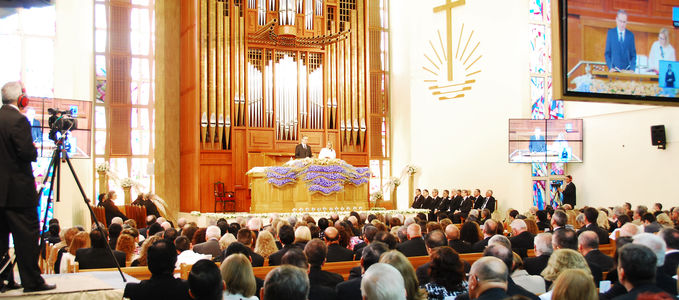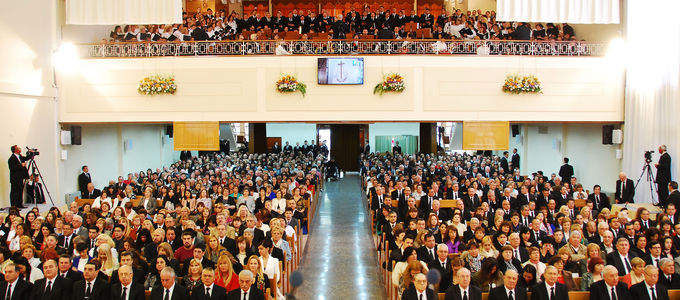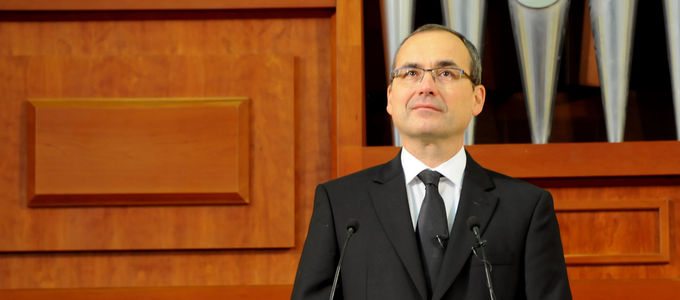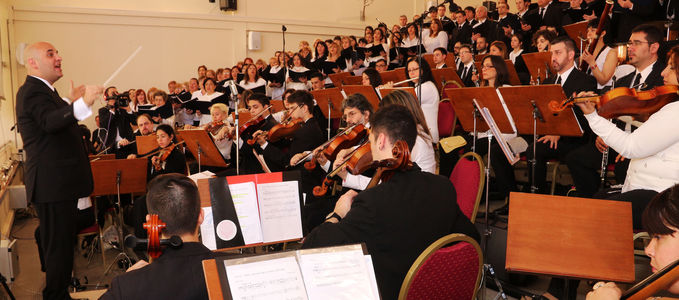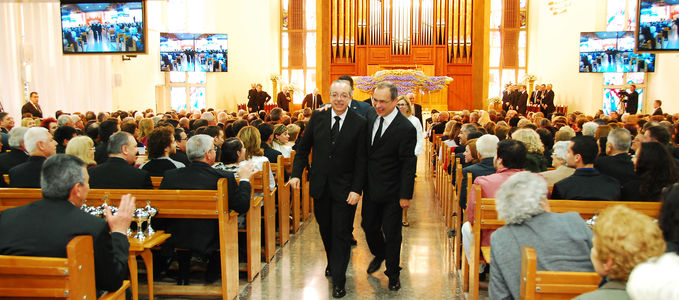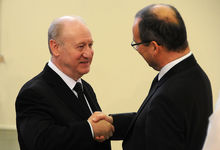A triad of Christian love
Whether friend, stranger, or enemy, every single one of them is our neighbour in the biblical sense. Jesus Christ demands that we love them. How is that possible? Answers from a divine service by the Chief Apostle …
Nearly 26,000 participated in the divine service either directly or by video transmission when Chief Apostle Jean-Luc Schneider visited our central church in Buenos Aires in Argentina on 25 October 2015. He based his sermon on Romans 12: 13–14: “Be kindly affectionate to one another … distributing to the needs of the saints, given to hospitality. Bless those who persecute you; bless and do not curse.”
Sharing with the saints who are in need
Who are the saints? The saints “are not the perfect ones, because they do not exist,” the Chief Apostle said. “The saints are all those who have been sanctified by the sacrifice of Jesus; all those who are sanctified through the activity of the Holy Spirit in word and sacrament—our brothers and sisters.”
What needs are we talking about? “Jesus can help us with this question,” the Chief Apostle said with reference to Matthew 7: 12: “Therefore, whatever you want men to do to you, do also to them, for this is the Law and the Prophets.” And that means that “the needs of our brothers and sisters are the same as our needs,” he added.
- “We need love and care.” We want our brother and sister to share in our joy and pain. But that also means that we have to take an interest in their life, and share their cares and joys. It also means that we do not grab the attention of the brothers in terms of soul care all for ourselves, “because everyone needs love and support”.
- “Every one of us needs grace.” We expect our brother and sister to forgive us and let bygones be bygones. “Are we aware that our brother and sister have the same desire? Let us be merciful and grant them forgiveness.”
- “We want to meet God in His house.” For that we need a peaceful and calm atmosphere in the congregation. It happens, however, that conflicts are discussed openly “in the congregation, on the Internet, and on Facebook”, so the Chief Apostle. “That poisons the atmosphere in a congregation,” he added. “Let us rather do our best to resolve the conflict without telling everybody about it.”
Provide hospitality!
What does hospitality mean? “Hospitality means that we share what we have with strangers,” the Chief Apostle said. “We have to be aware that we too were strangers. We did not have the right to be part of the kingdom of God. We lacked everything. But God accepted us. Let us, therefore, also accept strangers and share with them the salvation we have received.”
“That also means that we do not envy those whose way to salvation is different from ours,” the Chief Apostle said, and gave an example. “We cannot expect the youth to carry the same burdens we had to carry. Times are different. It should not be a problem for us if they live their faith in a different way.”
This kind of hospitality creates blessing. “Living with strangers, with people who are different, who belong to another generation, or who have a different origin, helps us to put the focus on what is really important for our salvation: faith, love, and hope.”
“Bless those who persecute you”
How can you bless those who persecute you? “A very difficult task,” the Chief Apostle admitted. “But with the power of God it becomes possible.”
- “You first have to be aware that such people are victims too—they are instruments in the hand of the Devil.”
- What is important is that we gain the victory over evil. “It would be absolutely useless if we were to make those suffer who made us suffer.”
- “Jesus Christ is the only one who can gain the victory over evil. That is why we want our neighbour to find the way to Jesus Christ so that he can be delivered from evil as we are delivered from evil.”
The Chief Apostle concluded, “By remaining faithful and proclaiming the gospel through word and deed, and by praying for our neighbour, we are a blessing for those who persecute us.” That is a task for the whole congregation. “If we fulfil this task, we will experience the blessing of God and the joy of Christ.”
Article info
Author:
Date:
Keywords:
Andreas Rother
24.11.2015
Argentina,
Chief Apostle,
Divine service




